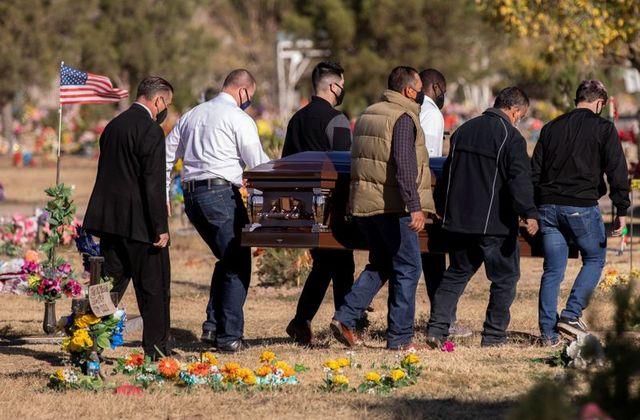NEW YORK, Dec. 11 (CNA) - US officials prepared on Friday (Dec 11) for the most ambitious vaccination campaign in decades as regulators rapidly advanced toward approving the first COVID-19 vaccine to slow a pandemic now killing 3,000 Americans per day.
Another 2,902 US deaths were reported on Thursday, a day after a record 3,253 people died, a pace projected to continue for the next two to three months even with a rapid rollout of inoculations, which could start as soon as Monday.
Moving with unprecedented speed, the US Food and Drug Administration (FDA) on Friday was on the cusp of approving emergency use of the coronavirus vaccine developed by Pfizer with its German partner BioNTech.
"The FDA informed Pfizer that they do intend to proceed towards an authorization for their vaccine," Health and Human Services Secretary Alex Azar told ABC News on Friday.
"We will work with Pfizer to get that shipped out so we could be seeing people getting vaccinated Monday or Tuesday," Azar said.
Britain, Bahrain and Canada have already approved the Pfizer vaccine, and the US advisory panel is due to review a second vaccine from Moderna next week.
Other vaccine candidates are in the works as the United States gears up for a campaign evocative of the polio inoculations of the 1950s and 1960s.
New York City will open a "Vaccine Command Center" across the street from City Hall on Monday to coordinate distribution throughout the city. Particular attention will be paid to the 27 hardest-hit neighborhoods largely populated by ethnic minorities, Mayor Bill de Blasio said.
"This is unprecedented because it's not just about logistics, it's about making sure we win public trust, it's about ensuring equity," de Blasio told a news briefing on Friday, promising to offer daily updates on the rollout.
New York state expects to receive 346,000 doses of the Moderna vaccine the week of Dec 21, on top of the 170,000 Pfizer doses coming this weekend, Governor Andrew Cuomo told a news conference.
An Indiana hospital that is one of the first designated to administer the vaccine was to rehearse its vaccination procedures on Friday, with pharmacists, nurses and doctors taking part.
The Indiana University Health will practice storing, transporting and giving the vaccine shot to patients.
"We want to make sure that we are perfectly ready and open with a bang," said Kristen Kelley, director of infection prevention at IU Health.
While most vaccines take years to develop, the Pfizer vaccine arrives less than a year after the illness was traced to a market in Wuhan, China, in December of last year.
Chinese officials shared the genetic sequence of the novel coronavirus with the World Health Organization on Jan 12, triggering the international race toward a vaccine.
A US rollout faces significant logistical challenges to meet President-elect Joe Biden's goal of inoculating 100 million people within 100 days of his inauguration on Jan 20.
But any American who wants a vaccine should be able to get one by May or June, Assistant US Health Secretary Brett Giroir told Fox News on Friday.
States will determine who gets the vaccine first and were likely to focus on healthcare workers and people in long-term care facilities, followed by the elderly, people with chronic conditions and first responders, Giroir said.
There is cause for concern about Americans' skepticism of vaccines, with only 61 per cent saying they are open to getting vaccinated, according to a Reuters/Ipsos poll.
In the meantime, grim statistics continue to pile up as more than 200,000 US cases per day were recorded for four straight days, with another 220,815 cases on Thursday, according to a Reuters tally of official data.
The United States has reported about 15.6 million cases and 292,642 deaths as of Thursday.
Deaths are projected to reach 502,000 by Apr 1, according to an influential model by the University of Washington's Institute for Health Metrics and Evaluation.
The institute revised that number down by about 37,000 on Thursday with the release of more detailed information about the vaccine and other factors.
By comparison, heart disease killed 655,381 people in the United States and cancer 599,274 in 2018, according to CDC data.





